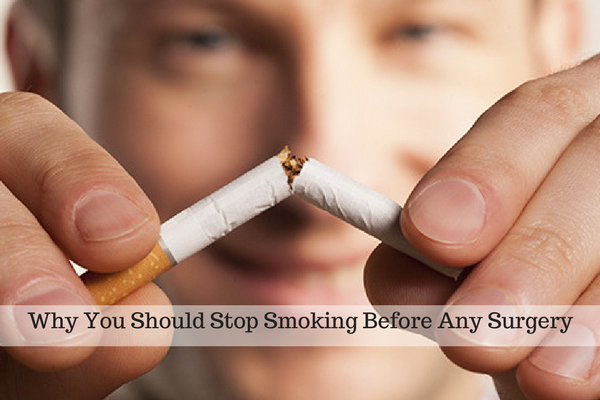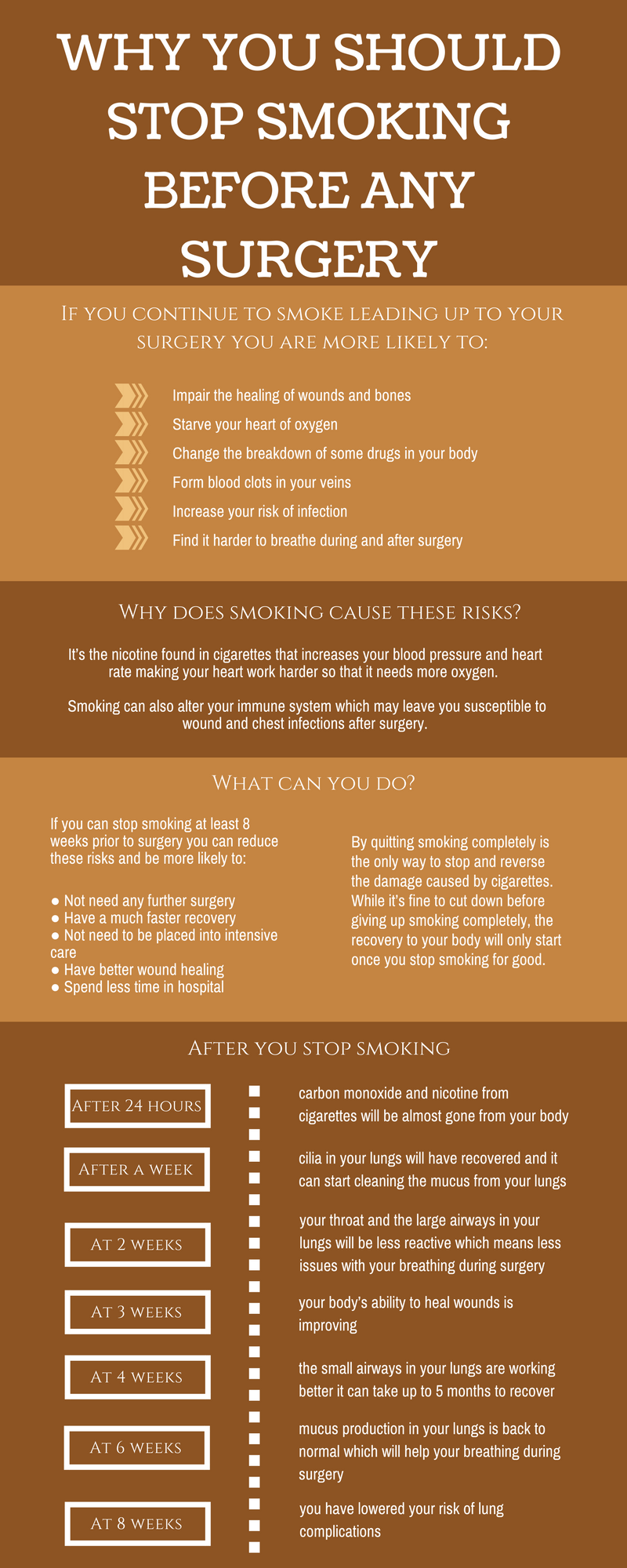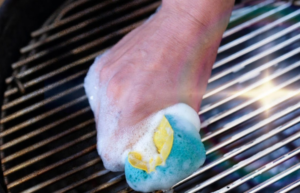Why You Should Stop Smoking Before Any Surgery

If you are a smoker, you will find that your Doctor will tell you should stop smoking at least 8 weeks before having any form of surgery. If you do smoke you are at risk of complications during and after your surgery. If you continue to smoke leading up to your surgery you are more likely to…
- Impair the healing of wounds and bones
- Starve your heart of oxygen
- Change the breakdown of some drugs in your body
- Form blood clots in your veins
- Increase your risk of infection
- Find it harder to breathe during and after surgery
Why does smoking cause these risks?
it’s the nicotine found in cigarettes that increases your blood pressure and heart rate making your heart work harder so that it needs more oxygen. Carbon monoxide in cigarette smoke competes with the oxygen in your blood making it harder for you to get that oxygen you need for your heart and body. Chemicals in cigarette smoke also makes your blood sticky, thicker and more lightly to form clots. Cilia in your lungs works to keep your lungs clear but the chemicals found in cigarette smoke destroy and paralyse that cilia. Smoking also narrows your airways, increasing the likelihood that airways and air sacs in your lungs will partially collapse making it harder for you to breathe.
Smoking can also alter your immune system which may leave you susceptible to wound and chest infections after surgery. The chances are increased that you will be at risk of a wound infection following surgery, problems with wounds healing, bad scarring and longer healing times. Smoking can also slow down or interfere with the healing of skin, bones and other body tissues. Chemicals found in cigarette smoke also interfere with the rate at which certain drugs break down in your body.
What can you do?
If you can stop smoking at least 8 weeks prior to surgery you can reduce these risks and be more likely to…
- Not need any further surgery
- Have a much faster recovery
- Not need to be placed into intensive care
- Have better wound healing
- Spend less time in hospital
By quitting smoking completely is the only way to stop and reverse the damage caused by cigarettes. If you cut down your smoking in the weeks before surgery it still will NOT reduce any of the risks or complications at all. While it’s fine to cut down before giving up smoking completely, the recovery to your body will only start once you stop smoking for good.

After you stop smoking
- After 24 hours the carbon monoxide and nicotine from cigarettes will be almost gone from your body, even if you stop smoking 12 hours before your surgery it will improve your blood oxygen levels and heart rate.
- After a week, the cilia in your lungs will have recovered and it can start cleaning the mucus from your lungs.
- At 2 weeks, you’ll find your throat and the large airways in your lungs will be less reactive which means less issues with your breathing during surgery
- At 3 weeks, your body’s ability to heal wounds is improving
- At 4 weeks, while the small airways in your lungs are working better it can take up to 5 months to recover
- At 6 weeks’ mucus production in your lungs is back to normal which will help your breathing during surgery
- At 8 weeks, you have lowered your risk of lung complications. Your blood flow will have improved as it’s now less sticky and thick. Your immune system and your body’s response to the aesthetic has also improved. Your risks of any wound complications have improved. None of this is possible if you have continued to smoke in the 8 weeks leading up to your surgery.
Of course, the rate at which you recover also depends on other things – for example if you already have a smoking-related illness.
Following surgery, it’s important that you don’t start smoking again. Even if you have only stopped smoking 12 hours prior to your surgery, you need to allow your body the chance to heal itself and to recover fully. Smoking will hamper your recovery by affecting your blood pressure, by stressing your heart and by reducing oxygen levels in your body tissues and blood which damages your lungs.
Passive smoking
Non-smokers should avoid other people’s tobacco smoke before surgery. Children and adults exposed to tobacco smoke prior to surgery have more breathing difficulties after a general anaesthetic than non-smokers who haven’t been exposed to passive smoking. After surgery, children who have been exposed to tobacco smoke have lower levels of oxygen in their blood.
This article has been provided by Sydney Based Plastic Surgeon Dr Michael Zacharia.







